Thomas James Richards, Diaries, Transcript Vol. 2 - Part 2
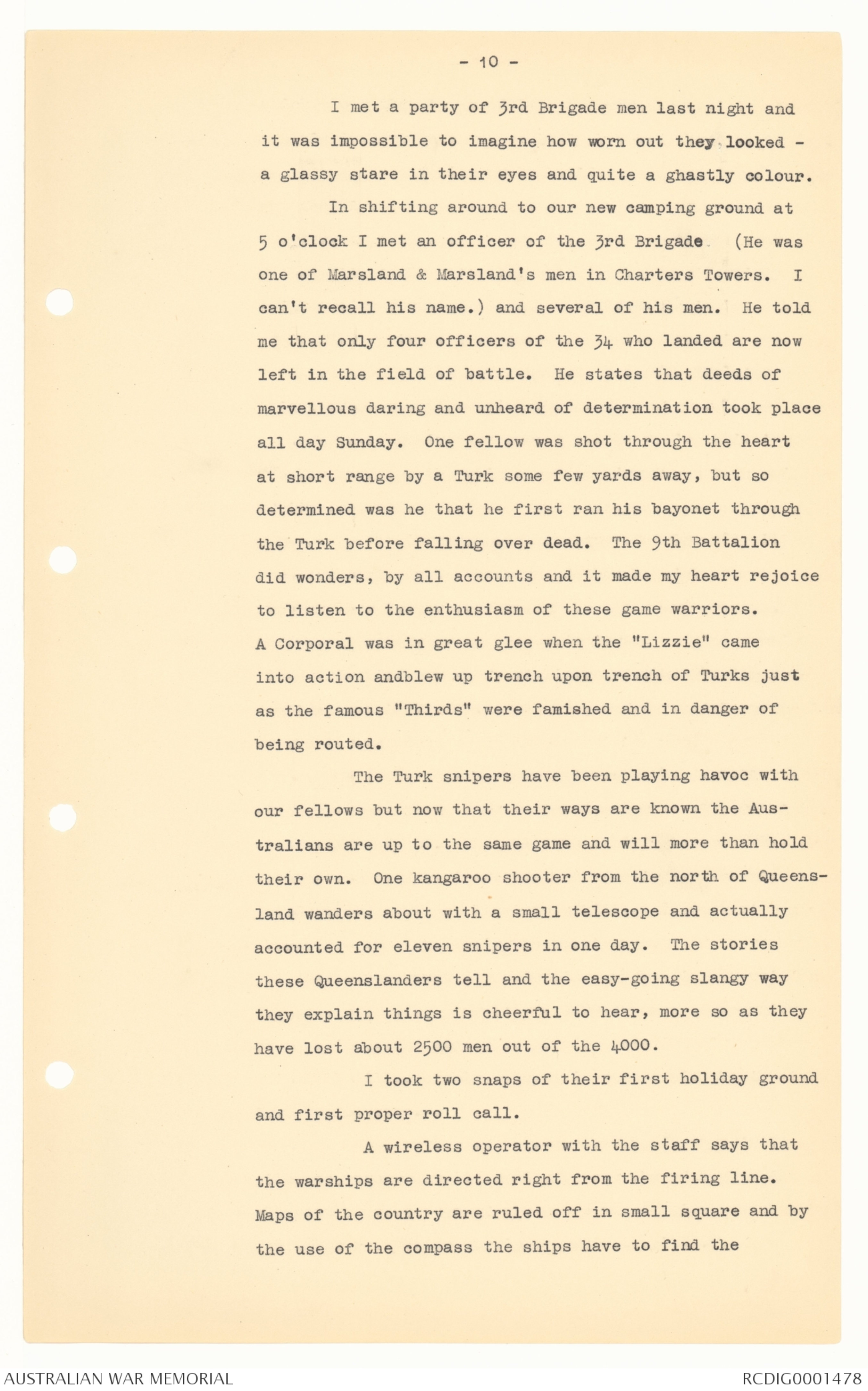
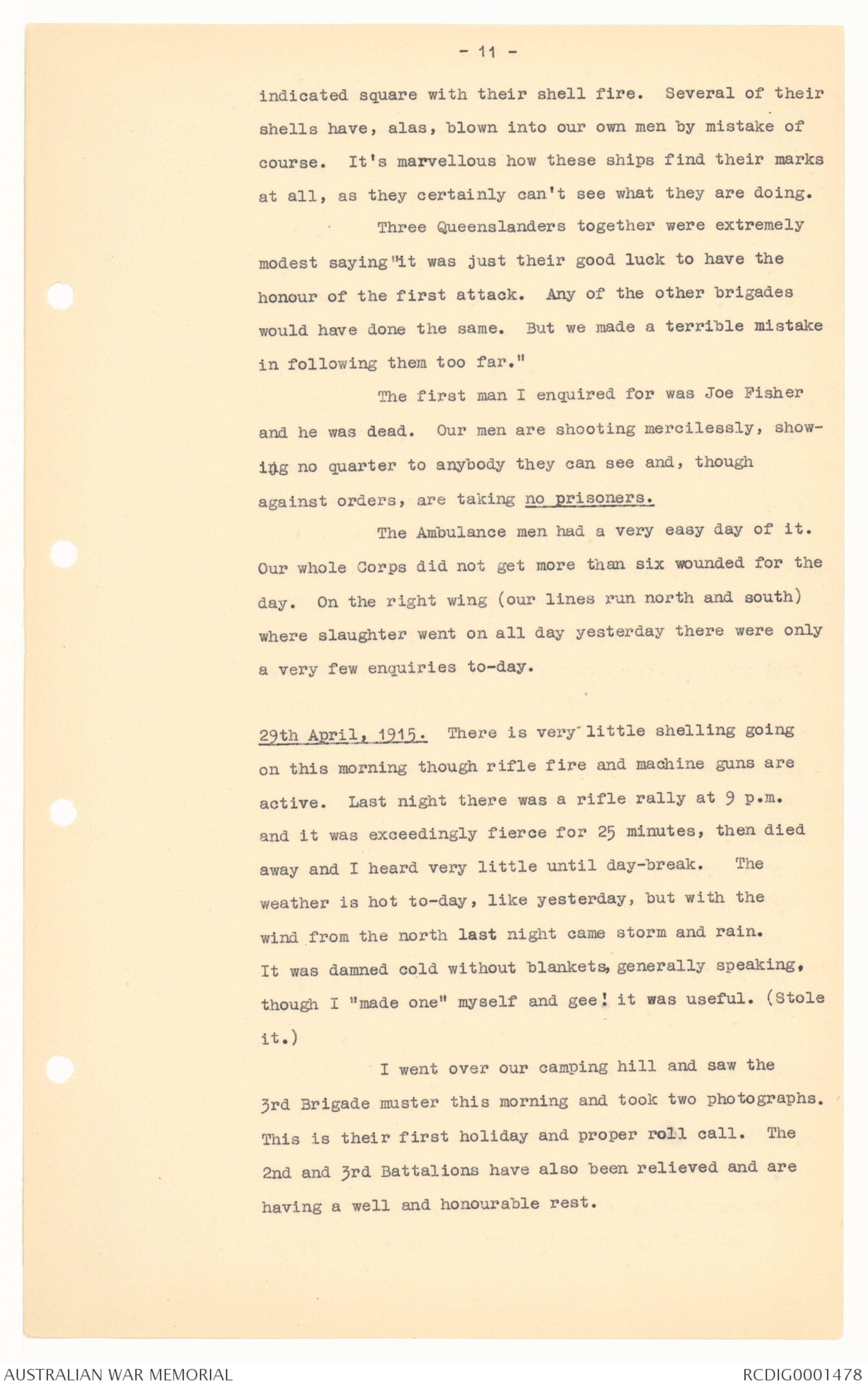
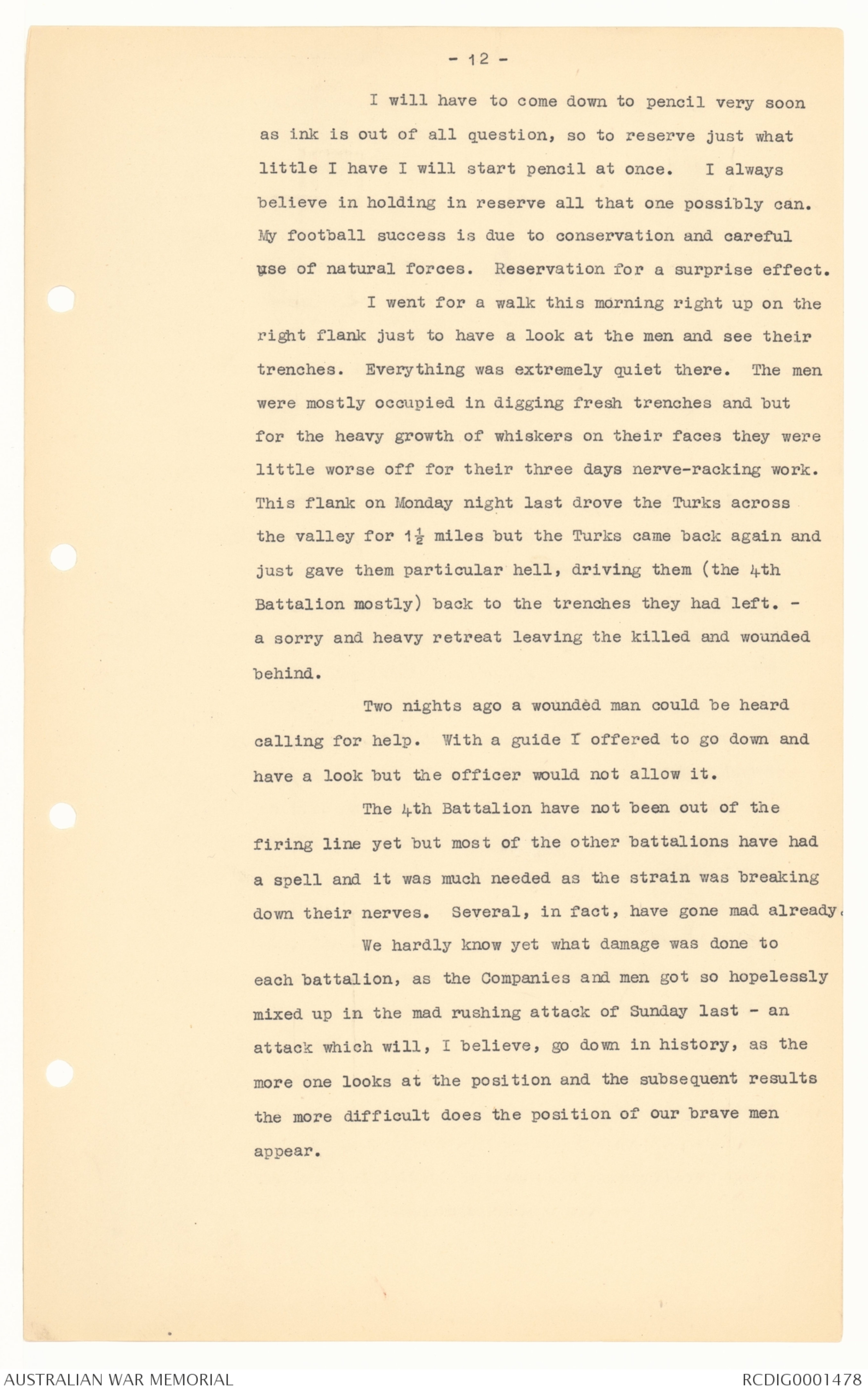
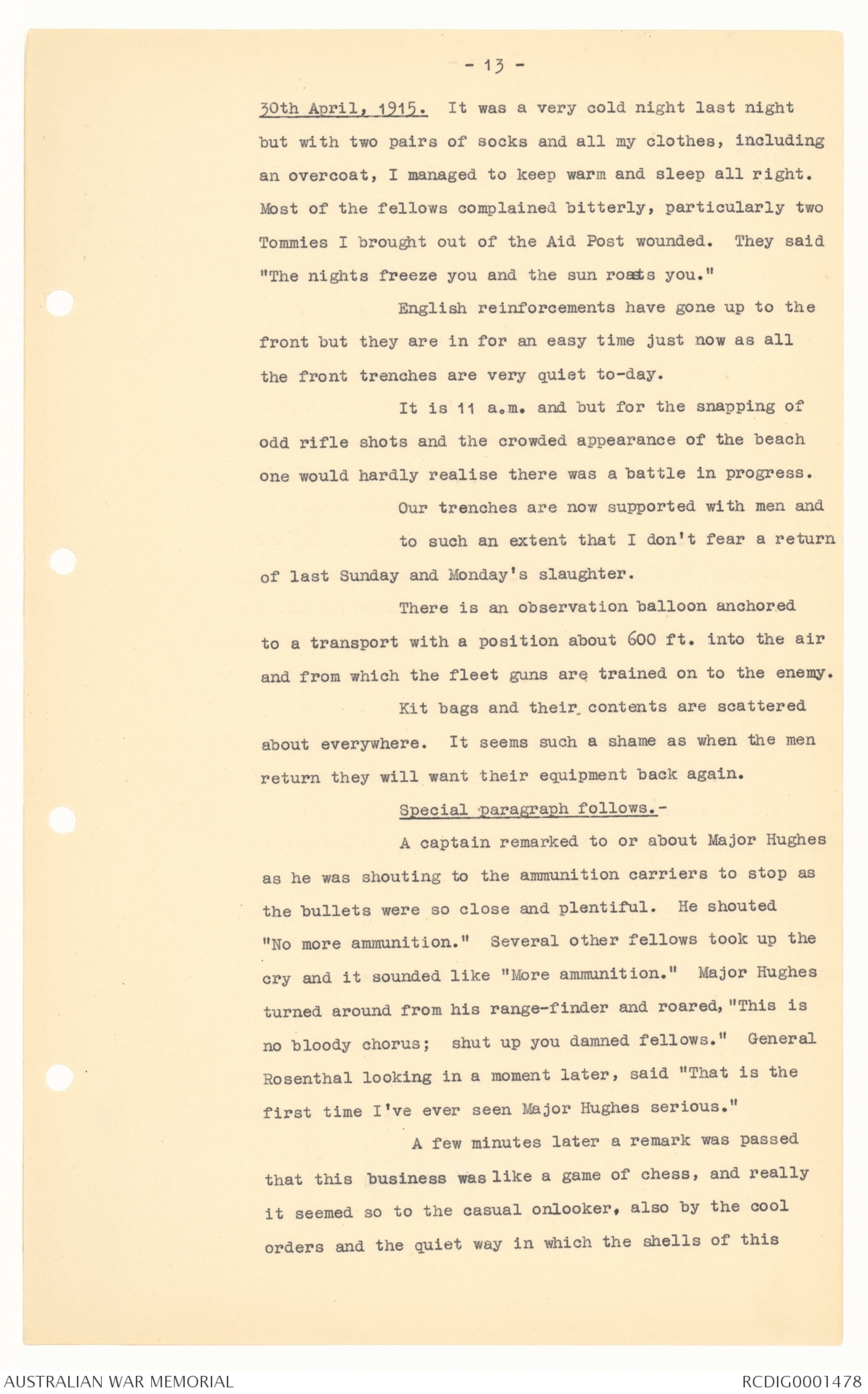
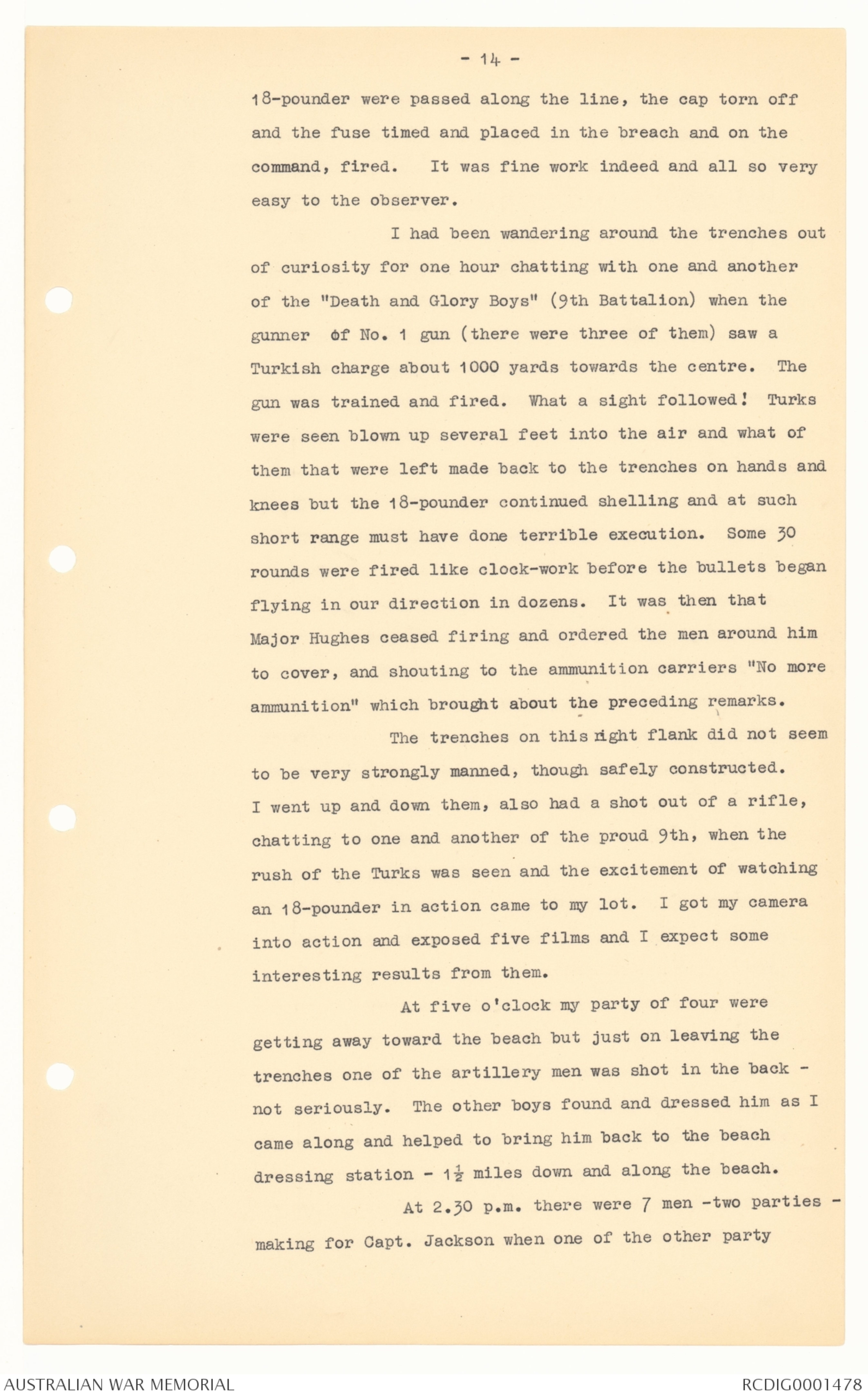
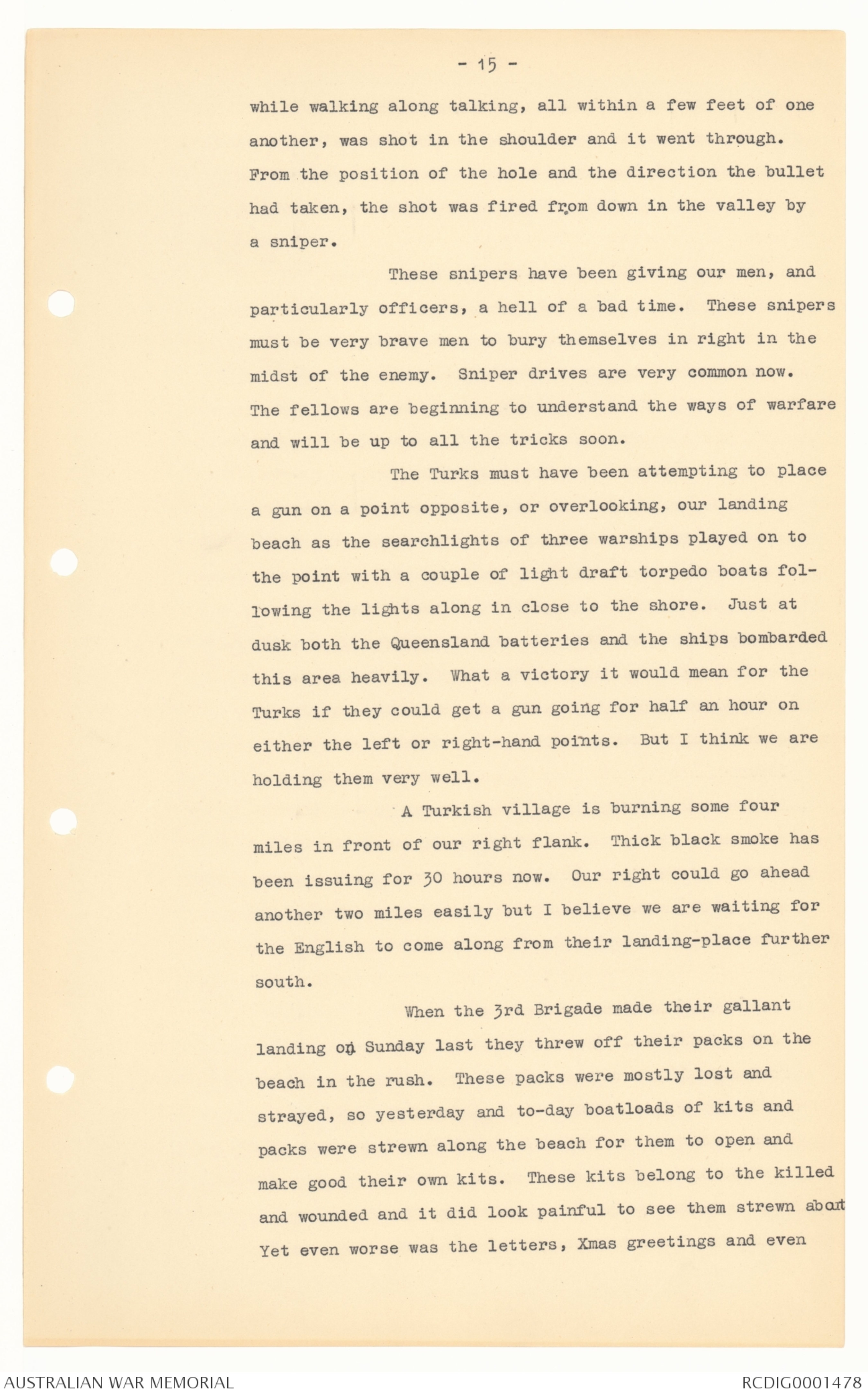
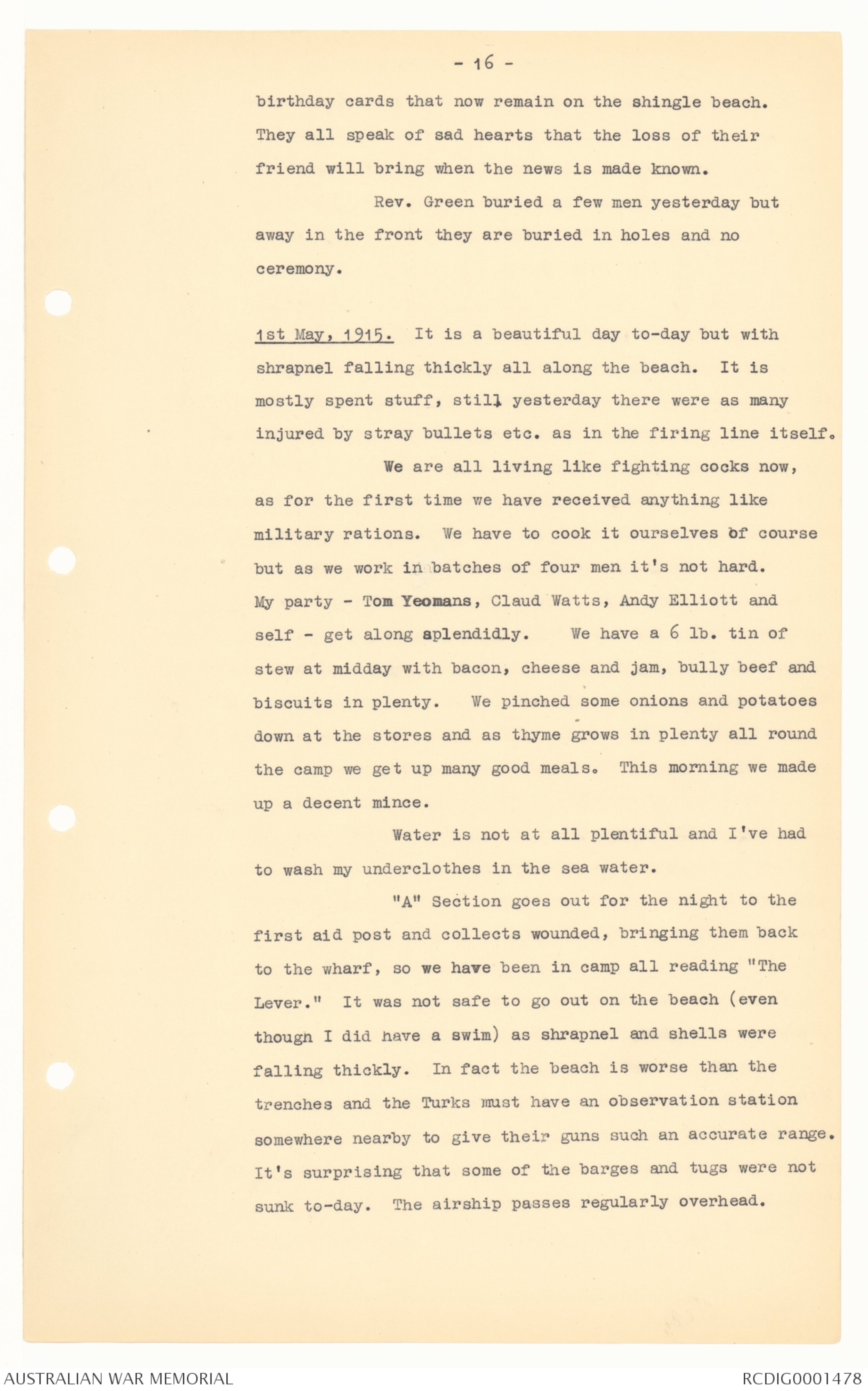
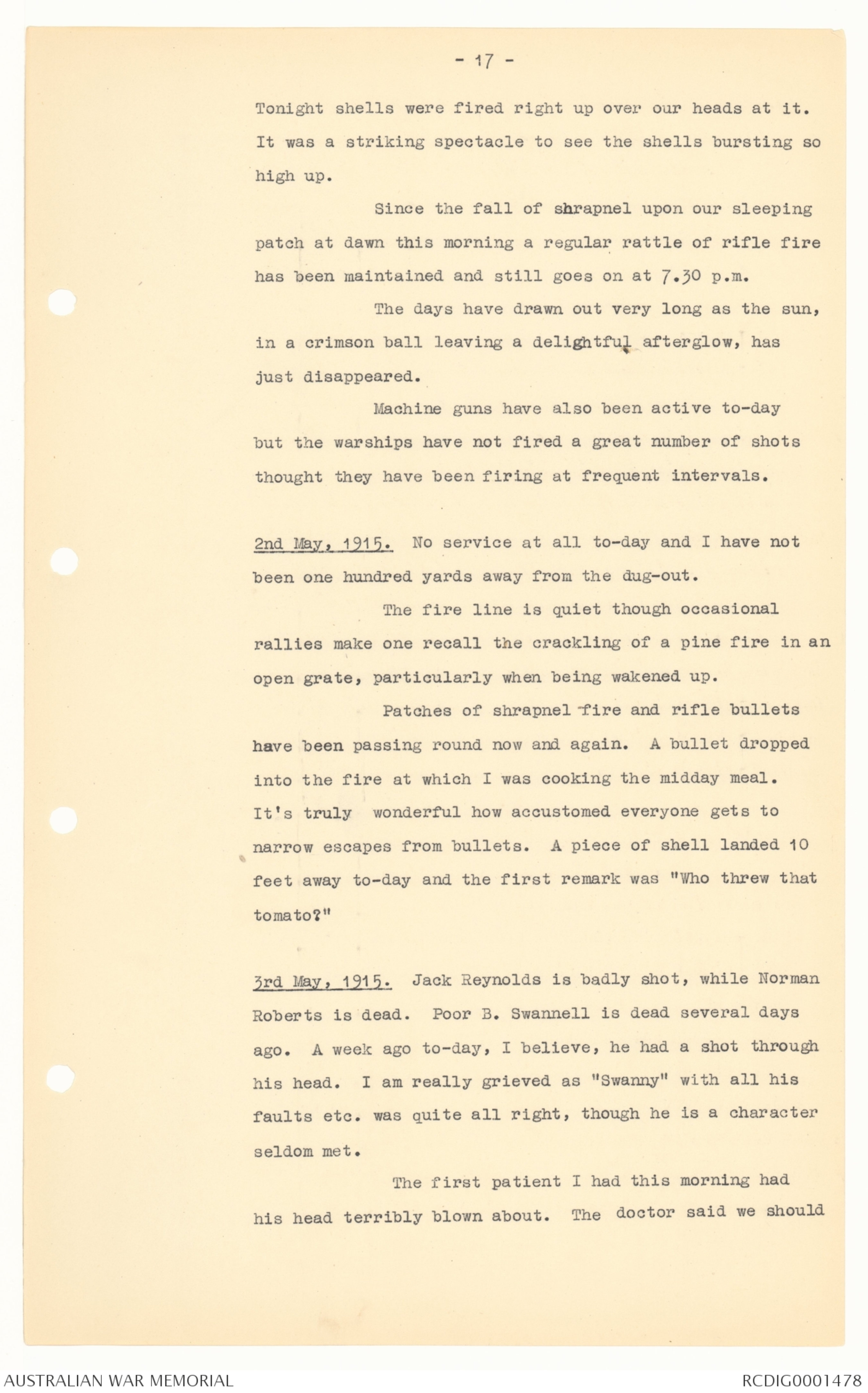
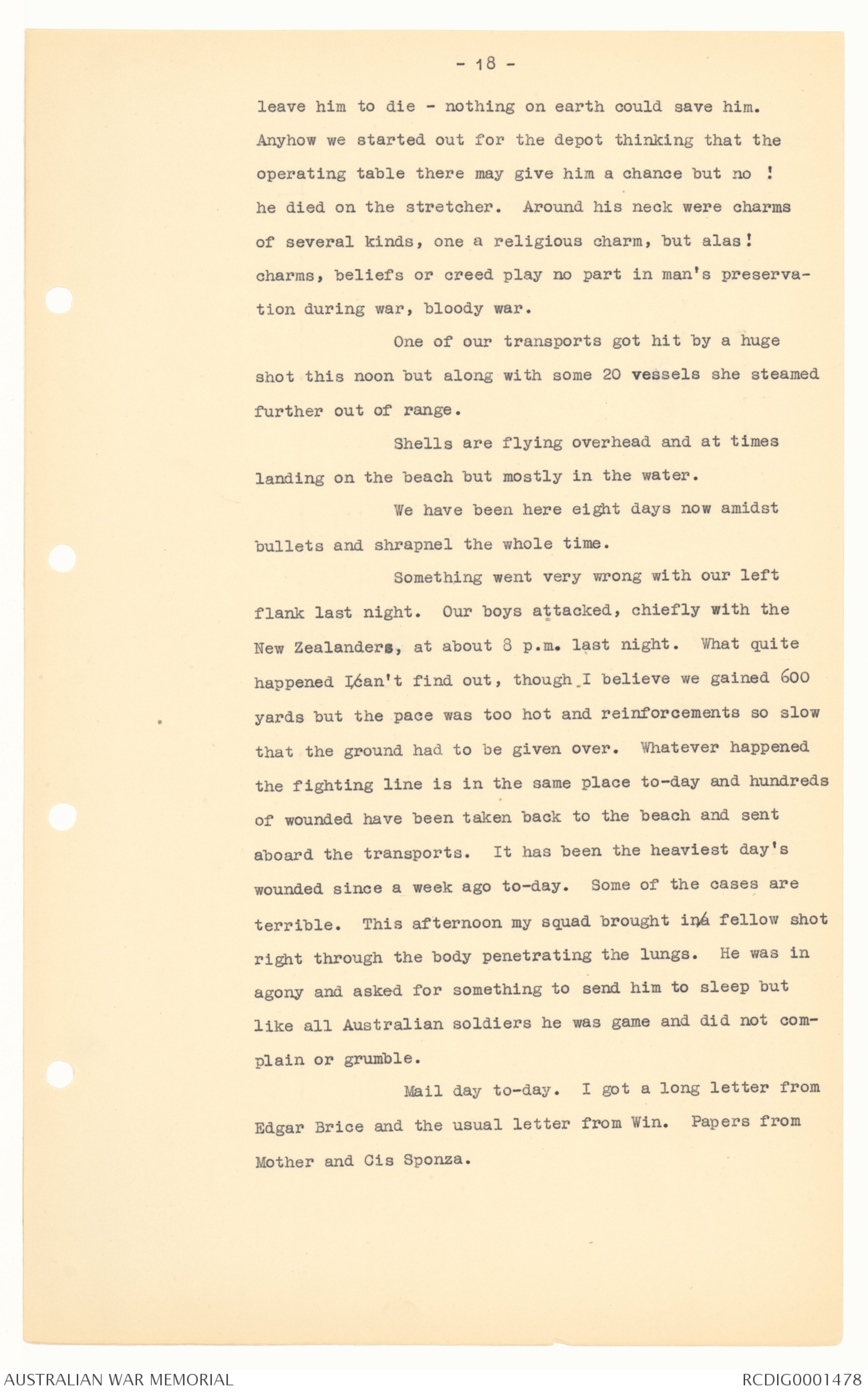
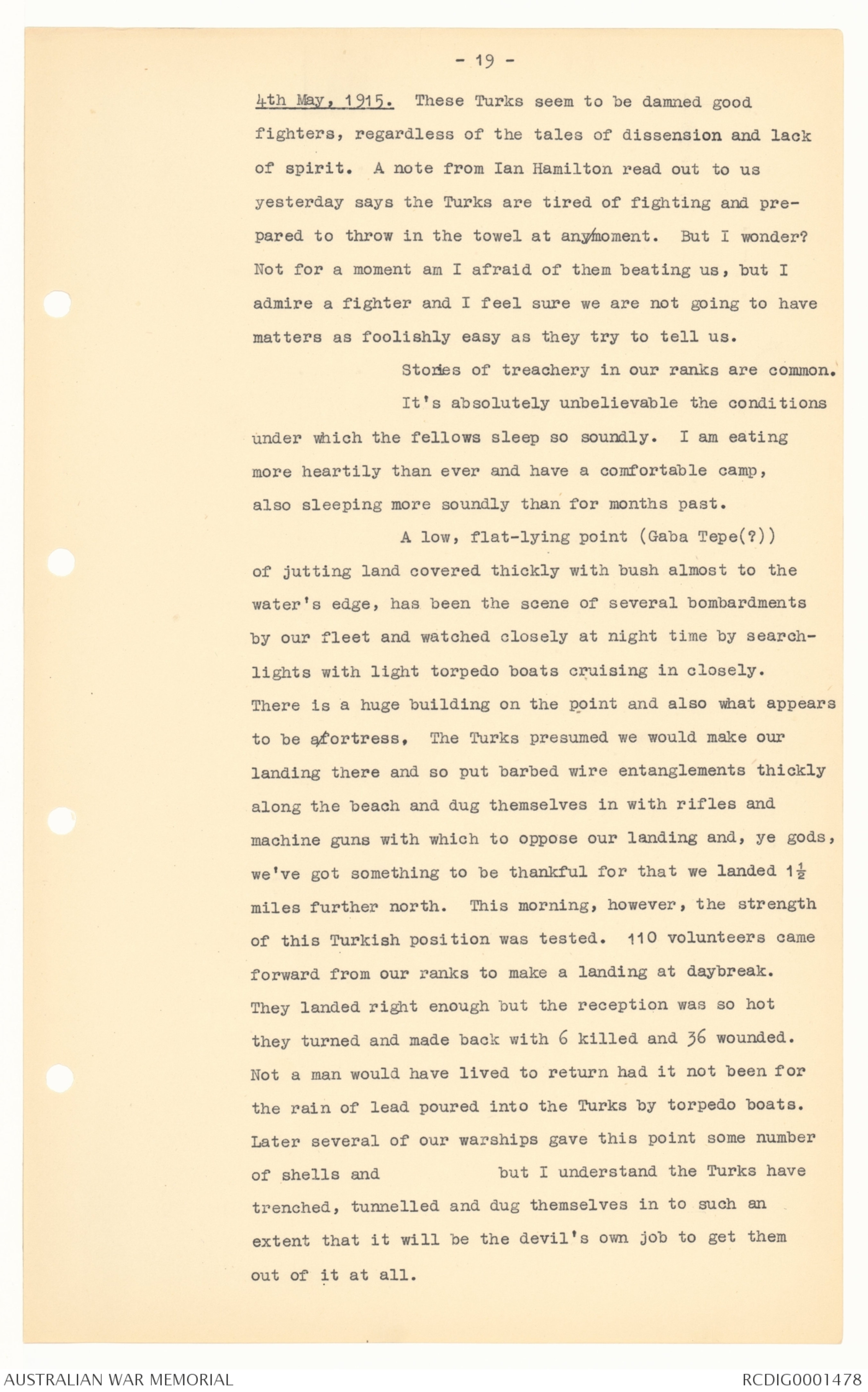
- 10 -
I met a party of 3rd Brigade men last night and
it was impossible to imagine how worn out they, looked -
a glassy stare in their eyes and quite a ghastly colour.
In shifting around to our new camping ground at
5 o'clock I met an officer of the 3rd Brigade. (He was
one of Marsland & Marsland's men in Charters Towers. I
can't recall his name.) and several of his men. He told
me that only four officers of the 34 who landed are now
left in the field of battle. He states that deeds of
marvellous daring and unheard of determination took place
all day Sunday. One fellow was shot through the heart
at short range by a Turk some few yards away, but so
determined was he that he first ran his bayonet through
the Turk before falling over dead. The 9th Battalion
did wonders, by all accounts and it made my heart rejoice
to listen to the enthusiasm of these game warriors.
A Corporal was in great glee when the "Lizzie" came
into action andblew up trench upon trench of Turks just
as the famous "Thirds" were famished and in danger of
being routed.
The Turk snipers have been playing havoc with
our fellows but now that their ways are known the Australians
are up to the same game and will more than hold
their own. One kangaroo shooter from the north of Queensland
wanders about with a small telescope and actually
accounted for eleven snipers in one day. The stories
these Queenslanders tell and the easy-going slangy way
they explain things is cheerful to hear, more so as they
have lost about 2500 men out of the 4000.
I took two snaps of their first holiday ground
and first proper roll call.
A wireless operator with the staff says that
the warships are directed right from the firing line.
Maps of the country are ruled off in small square and by
the use of the compass the ships have to find the
- 11 -
indicated square with their shell fire. Several of their
shells have, alas, blown into our own men by mistake of
course. It's marvellous how these ships find their marks
at all, as they certainly can't see what they are doing.
Three Queenslanders together were extremely
modest saying "it was just their good luck to have the
honour of the first attack. Any of the other brigades
would have done the same. But we made a terrible mistake
in following them too far."
The first man I enquired for was Joe Fisher
and he was dead. Our men are shooting mercilessly, showing
no quarter to anybody they can see and, though
against orders, are taking no prisoners.
The Ambulance men had a very easy day of it.
Our whole Corps did not get more than six wounded for the
day. On the right wing (our lines run north and south)
where slaughter went on all day yesterday there were only
a very few enquiries to-day.
29th April, 1915. There is very little shelling going
on this morning though rifle fire and machine guns are
active. Last night there was a rifle rally at 9 p.m.
and it was exceedingly fierce for 25 minutes, then died
away and I heard very little until day-break. The
weather is hot to-day, like yesterday, but with the
wind from the north last night came storm and rain.
It was damned cold without blankets, generally speaking,
though I "made one" myself and gee! it was useful. (Stole
it.)
I went over our camping hill and saw the
3rd Brigade muster this morning and took two photographs.
This is their first holiday and proper roll call. The
2nd and 3rd Battalions have also been relieved and are
having a well and honourable rest.
- 12 -
I will have to come down to pencil very soon
as ink is out of all question, so to reserve just what
little I have I will start pencil at once. I always
believe in holding in reserve all that one possibly can.
My football success is due to conservation and careful
use of natural forces. Reservation for a surprise effect.
I went for a walk this morning right up on the
right flank just to have a look at the men and see their
trenches. Everything was extremely quiet there. The men
were mostly occupied in digging fresh trenches and but
for the heavy growth of whiskers on their faces they were
little worse off for their three days nerve-racking work.
This flank on Monday night last drove the Turks across
the valley for 1½ miles but the Turks came back again and
just gave them particular hell, driving them (the 4th
Battalion mostly) back to the trenches they had left. -
a sorry and heavy retreat leaving the killed and wounded
behind.
Two nights ago a wounded man could be heard
calling for help. With a guide I offered to go down and
have a look but the officer would not allow it.
The 4th Battalion have not been out of the
firing line yet but most of the other battalions have had
a spell and it was much needed as the strain was breaking
down their nerves. Several, in fact, have gone mad already.
We hardly know yet what damage was done to
each battalion, as the Companies and men got so hopelessly
mixed up in the mad rushing attack of Sunday last - an
attack which will, I believe, go down in history, as the
more one looks at the position and the subsequent results
the more difficult does the position of our brave men
appear.
- 13 -
30th April, 1915. It was a very cold night last night
but with two pairs of socks and all my clothes, including
an overcoat, I managed to keep warm and sleep all right.
Most of the fellows complained bitterly, particularly two
Tommies I brought out of the Aid Post wounded. They said
"The nights freeze you and the sun roasts you."
English reinforcements have gone up to the
front but they are in for an easy time just now as all
the front trenches are very quiet to-day.
It is 11 a.m. and but for the snapping of
odd rifle shots and the crowded appearance of the beach
one would hardly realise there was a battle in progress.
Our trenches are now supported with men and
to such an extent that I don't fear a return
of last Sunday and Monday's slaughter.
There is an observation balloon anchored
to a transport with a position about 600 ft. into the air
and from which the fleet guns are trained on to the enemy.
Kit bags and their contents are scattered
about everywhere. It seems such a shame as when the men
return they will want their equipment back again.
Special paragraph follows.-
A captain remarked to or about Major Hughes
as he was shouting to the ammunition carriers to stop as
the bullets were so close and plentiful. He shouted
"No more ammunition." Several other fellows took up the
cry and it sounded like "More ammunition." Major Hughes
turned around from his range-finder and roared, "This is
no bloody chorus; shut up you damned fellows." General
Rosenthal looking in a moment later, said "That is the
first time I've ever seen Major Hughes serious."
A few minutes later a remark was passed
that this business was like a game of chess, and really
it seemed so to the casual onlooker, also by the cool
orders and the quiet way in which the shells of this
- 14 -
18-pounder were passed along the line, the cap torn off
and the fuse timed and placed in the breach and on the
command, fired. It was fine work indeed and all so very
easy to the observer.
I had been wandering around the trenches out
of curiosity for one hour chatting with one and another
of the "Death and Glory Boys" (9th Battalion) when the
gunner of No. 1 gun (there were three of them) saw a
Turkish charge about 1000 yards towards the centre. The
gun was trained and fired. What a sight followed! Turks
were seen blown up several feet into the air and what of
them that were left made back to the trenches on hands and
knees but the 18-pounder continued shelling and at such
short range must have done terrible execution. Some 30
rounds were fired like clock-work before the bullets began
flying in our direction in dozens. It was then that
Major Hughes ceased firing and ordered the men around him
to cover, and shouting to the ammunition carriers "No more
ammunition" which brought about the preceding remarks.
The trenches on this right flank did not seem
to be very strongly manned, though safely constructed.
I went up and down them, also had a shot out of a rifle,
chatting to one and another of the proud 9th, when the
rush of the Turks was seen and the excitement of watching
an 18-pounder in action came to my lot. I got my camera
into action and exposed five films and I expect some
interesting results from them.
At five o'clock my party of four were
getting away toward the beach but just on leaving the
trenches one of the artillery men was shot in the back -
not seriously. The other boys found and dressed him as I
came along and helped to bring him back to the beach
dressing station - 1½ miles down and along the beach.
At 2.30 p.m. there were 7 men - two parties -
making for Capt. Jackson when one of the other party
- 15 -
while walking along talking, all within a few feet of one
another, was shot in the shoulder and it went through.
From the position of the hole and the direction the bullet
had taken, the shot was fired from down in the valley by
a sniper.
These snipers have been giving our men, and
particularly officers, a hell of a bad time. These snipers
must be very brave men to bury themselves in right in the
midst of the enemy. Sniper drives are very common now.
The fellows are beginning to understand the ways of warfare
and will be up to all the tricks soon.
The Turks must have been attempting to place
a gun on a point opposite, or overlooking, our landing
beach as the searchlights of three warships played on to
the point with a couple of light draft torpedo boats following
the lights along in close to the shore. Just at
dusk both the Queensland batteries and the ships bombarded
this area heavily. What a victory it would mean for the
Turks if they could get a gun going for half an hour on
either the left or right-hand points. But I think we are
holding them very well.
A Turkish village is burning some four
miles in front of our right flank. Thick black smoke has
been issuing for 30 hours now. Our right could go ahead
another two miles easily but I believe we are waiting for
the English to come along from their landing-place further
south.
When the 3rd Brigade made their gallant
landing on Sunday last they threw off their packs on the
beach in the rush. These packs were mostly lost and
strayed, so yesterday and to-day boatloads of kits and
packs were strewn along the beach for them to open and
make good their own kits. These kits belong to the killed
and wounded and it did look painful to see them strewn about
Yet even worse was the letters, Xmas greetings and even
- 16 -
birthday cards that now remain on the shingle beach.
They all speak of sad hearts that the loss of their
friend will bring when the news is made known.
Rev. Green buried a few men yesterday but
away in the front they are buried in holes and no
ceremony.
1st May, 1915. It is a beautiful day to-day but with
shrapnel falling thickly all along the beach. It is
mostly spent stuff, still yesterday there were as many
injured by stray bullets etc. as in the firing line itself.
We are all living like fighting cocks now,
as for the first time we have received anything like
military rations. We have to cook it ourselves of course
but as we work in batches of four men it's not hard.
My party - Tom Yeomans, Claud Watts, Andy Elliott and
self - get along splendidly. We have a 6 lb. tin of
stew at midday with bacon, cheese and jam, bully beef and
biscuits in plenty. We pinched some onions and potatoes
down at the stores and as thyme grows in plenty all round
the camp we get up many good meals. This morning we made
up a decent mince.
Water is not at all plentiful and I've had
to wash my underclothes in the sea water.
"A" Section goes out for the night to the
first aid post and collects wounded, bringing them back
to the wharf, so we have been in camp all reading "The
Lever." It was not safe to go out on the beach (even
though I did have a swim) as shrapnel and shells were
falling thickly. In fact the beach is worse than the
trenches and the Turks must have an observation station
somewhere nearby to give their guns such an accurate range.
It's surprising that some of the barges and tugs were not
sunk to-day. The airship passes regularly overhead.
- 17 -
Tonight shells were fired right up over our heads at it.
It was a striking spectacle to see the shells bursting so
high up.
Since the fall of shrapnel upon our sleeping
patch at dawn this morning a regular rattle of rifle fire
has been maintained and still goes on at 7.30 p.m.
The days have drawn out very long as the sun,
in a crimson ball leaving a delightful afterglow, has
just disappeared.
Machine guns have also been active to-day
but the warships have not fired a great number of shots
thought they have been firing at frequent intervals.
2nd May, 1915. No service at all to-day and I have not
been one hundred yards away from the dug-out.
The fire line is quiet though occasional
rallies make one recall the crackling of a pine fire in an
open grate, particularly when being wakened up.
Patches of shrapnel fire and rifle bullets
have been passing round now and again. A bullet dropped
into the fire at which I was cooking the midday meal.
It's truly wonderful how accustomed everyone gets to
narrow escapes from bullets. A piece of shell landed 10
feet away to-day and the first remark was "Who threw that
tomato?'
3rd May, 1915. Jack Reynolds is badly shot, while Norman
Roberts is dead. Poor B. Swannell is dead several days
ago. A week ago to-day, I believe, he had a shot through
his head. I am really grieved as "Swanny" with all his
faults etc. was quite all right, though he is a character
seldom met.
The first patient I had this morning had
his head terribly blown about. The doctor said we should
- 18 -
leave him to die - nothing on earth could save him.
Anyhow we started out for the depot thinking that the
operating table there may give him a chance but no !
he died on the stretcher. Around his neck were charms
of several kinds, one a religious charm, but alas!
charms, beliefs or creed play no part in man's preservation
during war, bloody war.
One of our transports got hit by a huge
shot this noon but along with some 20 vessels she steamed
further out of range.
Shells are flying overhead and at times
landing on the beach but mostly in the water.
We have been here eight days now amidst
bullets and shrapnel the whole time.
Something went very wrong with our left
flank last night. Our boys attacked, chiefly with the
New Zealanders, at about 8 p.m. last night. What quite
happened I can't find out, though I believe we gained 600
yards but the pace was too hot and reinforcements so slow
that the ground had to be given over. Whatever happened
the fighting line is in the same place to-day and hundreds
of wounded have been taken back to the beach and sent
aboard the transports. It has been the heaviest day's
wounded since a week ago to-day. Some of the cases are
terrible. This afternoon my squad brought in a fellow shot
right through the body penetrating the lungs. He was in
agony and asked for something to send him to sleep but
like all Australian soldiers he was game and did not complain
or grumble.
Mail day to-day. I got a long letter from
Edgar Brice and the usual letter from Win. Papers from
Mother and Cis Sponza.
- 19 -
4th May, 1915. These Turks seem to be damned good
fighters, regardless of the tales of dissension and lack
of spirit. A note from Ian Hamilton read out to us
yesterday says the Turks are tired of fighting and prepared
to throw in the towel at any moment. But I wonder?
Not for a moment am I afraid of them beating us, but I
admire a fighter and I feel sure we are not going to have
matters as foolishly easy as they try to tell us.
Stories of treachery in our ranks are common.
It's absolutely unbelievable the conditions
under which the fellows sleep so soundly. I am eating
more heartily than ever and have a comfortable camp,
also sleeping more soundly than for months past.
A low, flat-lying point (Gaba Tepe (?))
of jutting land covered thickly with bush almost to the
water's edge, has been the scene of several bombardments
by our fleet and watched closely at night time by search-lights
with light torpedo boats cruising in closely.
There is a huge building on the point and also what appears
to be a fortress. The Turks presumed we would make our
landing there and so put barbed wire entanglements thickly
along the beach and dug themselves in with rifles and
machine guns with which to oppose our landing and, ye gods,
we've got something to be thankful for that we landed 1½
miles further north. This morning, however, the strength
of this Turkish position was tested. 110 volunteers came
forward from our ranks to make a landing at daybreak.
They landed right enough but the reception was so hot
they turned and made back with 6 killed and 36 wounded.
Not a man would have lived to return had it not been for
the rain of lead poured into the Turks by torpedo boats.
Later several of our warships gave this point some number
of shells and but I understand the Turks have
trenched, tunnelled and dug themselves in to such an
extent that it will be the devil's own job to get them
out of it at all.
 Transcriber 17837
Transcriber 17837This transcription item is now locked to you for editing. To release the lock either Save your changes or Cancel.
This lock will be automatically released after 60 minutes of inactivity.